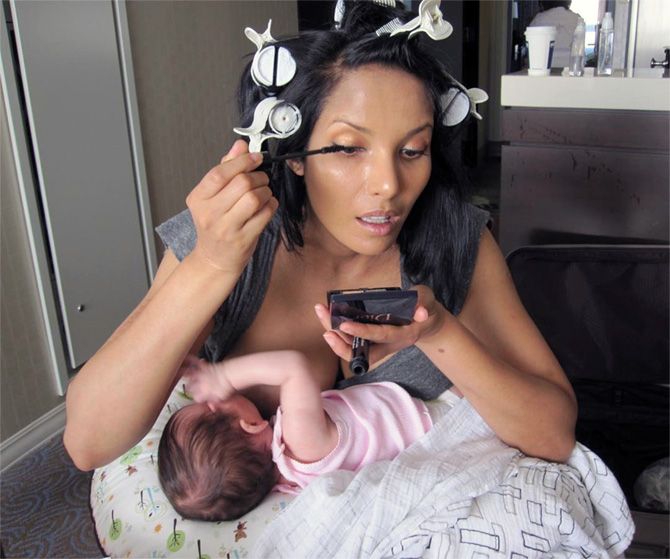Don't believe us? Listen to what doctors have to say this World Breastfeeding Week then.

Photograph: Courtesy @padmalakshmi/Instagram.
Why is it that before embarking on one of the most important journey of our lives i.e. parenting, we don't bother to acquire knowledge about breastfeeding, wonders Dr Shacchee Baweja, a lactation consultant.
"As per my experience, it is because of the concept in our society that breastfeeding is a natural thing and should happen on its own," she says. "But if this is true, then why do we have such lower breastfeeding rates in our society?"
As we mark the World Breastfeeding Week -- August 1 to August 7 -- Dr Baweja points out, "I very commonly meet moms who are either not able to feed their babies or face so many challenges that they get disheartened and give up. Contrary to popular belief, it is not due to lack of will or efforts on mothers part.
"As a rule, majority of mothers have the capacity to produce adequate breast milk for their baby/ babies, and with correct knowledge and guidance, breastfeeding can be one of the happiest phases in a mother's life."
According to Dr Baweja, the main problem is lack of correct knowledge and skilled breastfeeding support.
Antenatal breastfeeding education or pregnancy breastfeeding classes are not a new concept in India.
In olden times, when the joint family system was the norm, pregnant ladies were taught about the basics of pregnancy and breastfeeding. There used to be many females in the family in different stages of pregnancy and breastfeeding and it used to be a kind of learning experience for would be mothers.
But now with most new parents living as nuclear families it has become important to seek out classes on breastfeeding your newborn.
Dr Archana Dhawan Bajaj, gynecologist and obstetrician, Nurture IVF Centre says, "Breastfeeding is the most natural way to feed the baby that not only positively affects the health of the newborn, but protects the mother from various Fatal disease i.e. breast and ovarian cancer."
She adds, "In recent times, issues of lactation have been seen in new mothers due to several combined lifestyle issues. For a new mother, maintaining hygiene and having proper knowledge and guidance on lactation is important as it is the most important phase of motherhood."
An antenatal breastfeeding class includes:
- Guidance for mothers about anticipated situations and signs of effective breast-feeding or breastfeeding problems.
- The benefits of breastfeeding to mother, baby, and society.
- Correct positioning to help the infant latch onto the breast effectively.
- Specific needs in the early days of breastfeeding.
- Resources for help with problems.
- Common fears, concerns, problems, and myths.
These classes provide formal breastfeeding education, which is over and above the breastfeeding information given as part of standard doctor visits during pregnancy, and these include individual or group education sessions led by peer counselors or health professionals, lactation, consultation, distribution of printed/written materials, video demonstrations and inclusion of prospective fathers and the family in learning activities.
Dr Bajaj says, "The first feeding after the birth is very important as it contains pre-milk, colostrums, which protects the baby from various illness. In today's world, because of lifestyle issue and busy work schedule lots of women are giving up breastfeeding at an early age, after 6 months or 3 months. In these scenarios, antenatal breastfeeding education is important. Nowadays, it has also been seen that formula feeding is in use more; this increases risk of obesity during early childhood. Bottle feeding is the major reason of a stomach upset in babies."











 © 2025
© 2025